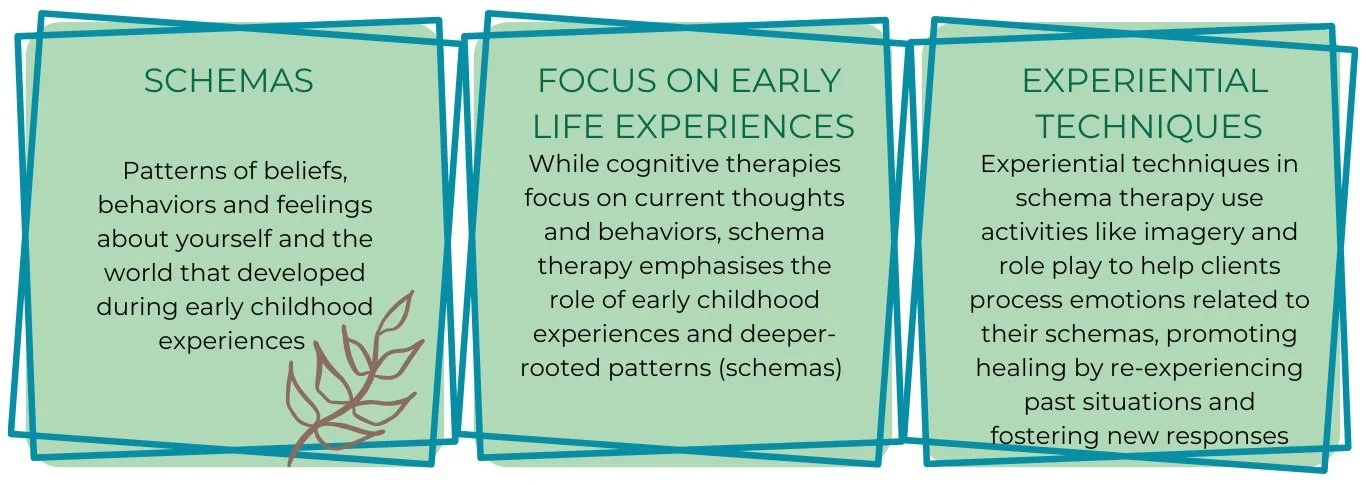
We offer a wide range of mental health services that use a variety of evidence-based approaches to suit your needs and preferences, including;
Cognitive Behavioural Therapy
Cognitive behavioural therapy (CBT) Is based on the idea that how you think impacts your emotions, bodily sensations and ultimately how you behave. CBT is a structured, time-limited psychotherapy that aims to change patterns of thinking or behavior that are causing people's problems. It focuses on identifying and challenging negative thought patterns and beliefs, and replacing them with more realistic and positive ones. CBT also involves developing coping strategies and skills to manage difficult emotions and behaviors.
Eye Movement Desensitisation and Reprocessing (EMDR)
Eye Movement Desensitization and Reprocessing (EMDR) is a psychotherapy technique designed to help individuals process and heal from traumatic and distressing experiences. It is becoming one of the most sought after therapies that can be used in a wide range of clinical presentations. There is a specific procedure that is followed in EMDR treatment, with attention being paid to individuals past, present and future functioning. EMDR helps to rewire the brain's response to trauma, reducing the emotional impact of the memories and promoting psychological healing.
Acceptance and Commitment Therapy
Acceptance and commitment therapy (ACT) focuses on helping people to behave more consistently with their values and to apply mindfulness and acceptance skills to their responses to uncontrollable life experiences. ACT is a form of psychotherapy that encourages individuals to accept their thoughts and feelings rather than fighting them and to focus instead on developing behaviours that are more aligned with their values. The goal is to help people live a more meaningful life by aligning their actions with their values, despite difficult emotions or thoughts.
Dialectical Behavioural Therapy
Dialectical behaviour therapy (DBT) uses the seemingly opposing strategies of acceptance and change. Dialectical itself means 'working with opposites'. DBT helps people to accept the reality of their lives while working towards changing unhelpful behaviors.DBT is a type of cognitive-behavioral therapy designed to help people manage intense emotions and improve their relationships. It combines strategies like mindfulness, distress tolerance, emotion regulation, and interpersonal effectiveness.
Schema Therapy
Schema Therapy is an integrative psychotherapy that combines elements of cognitive-behavioral therapy, attachment theory, and psychoanalytic concepts to treat chronic psychological issues. It focuses on identifying and changing deeply ingrained patterns or "schemas" that develop during childhood and influence thoughts, feelings, and behaviors throughout life. The therapy aims to help individuals understand and heal these schemas, leading to healthier coping mechanisms and improved emotional
Psychological Assessment
We offer psychological assessment services for both children and adults for the following concerns;
• Cognitive and academic assessment
• Attention Deficit Hyperactive Disorder
• Autism Spectrum Disorder (ASD)
• Cognitive assessment for adults
Clinical Supervision
We offer clinical supervision both in-person and via Zoom for clinicians working towards registration or mental health professionals seeking supervision as part of their CPD. We have three clinicians with experience in various areas of psychology who are Psychology Board/AHPRA approved supervisors
• Dee Cooper (also offers EMDR consultation for practitioners seeking accreditation or wanting to become an EMDR consultant).
• Paul Bertoia
• Claire Goulston












